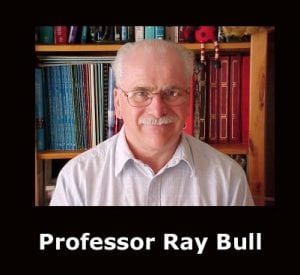On the 22nd Januar y, we are delighted to have Professor Ray Bull from the University of Derby come and visit the School of Psychology at the University of Lincoln. Prof Bull’s talk will take place in SSB0102 & SSB0103 from 2-3pm.
y, we are delighted to have Professor Ray Bull from the University of Derby come and visit the School of Psychology at the University of Lincoln. Prof Bull’s talk will take place in SSB0102 & SSB0103 from 2-3pm.
The title of the talk is “Research on the Improving of the interviewing of suspects” and will be of interest to many of staff and students. Information about the talk and Prof Bull can be found below.
About the talk:
The traditional method used with suspects is to interrogate them using an accusatory style, often from the beginning of the interrogation. Recent research in several countries consistently demonstrates that a noteworthy proportion of guilty suspects have already decided to confess before the interview commences, and thus this traditional approach may be ‘seen’ to work for them. For other suspects new research suggests such an approach may well not be effective. A different approach was adopted over 25 years ago in England, which is now being adopted elsewhere (e.g. in Australia, Japan, Norway, USA) and has been recommended by a United Nations ‘Special Rapporteur’. Instead of the seeking of confessions (that may provide very little information), this ‘new’ approach encourages suspects to provide as much relevant information as possible, the contents of which can be verified or challenged.
About Prof Ray Bull:
Ray Bull is a Professor of Criminal Investigation, University of Derby (UK), Emeritus Professor of Forensic Psychology, University of Leicester (UK) and Immediate Past-President of the European Association of Psychology and Law. His major research topic is investigative interviewing. Ray’s wealth of experience and contribution to scientific community has been recognised by several boards and organisations both here in the UK and abroad. In 2010 Ray was “Elected by acclaim” an Honorary Fellow of the British Psychological Society “for the contribution made to the discipline of psychology”. In 2010 he received from the Scientific Committee of the Fourth International Conference on Investigative Interviewing a “Special Prize” for his “extensive contributions to investigative interviewing”. In 2009 he was elected a Fellow by the Board of Directors of the Association of Psychological Sciences (formerly the American Psychological Society) for “sustained and outstanding distinguished contribution to psychological science” (FAPS). In 2009 Ray received from the ‘International Investigative Interviewing Research Group’ the ‘Senior Academic Award’ for his ‘significant lifetime contribution to the field of investigative interviewing’. In 2008 Ray received from the European Association of Psychology and Law an ‘Award for Life-time Contribution to Psychology and Law’. In 2008 he received from the British Psychological Society the ‘Award for Distinguished Contributions to Academic Knowledge in Forensic Psychology’. In 2005 he received a Commendation from the London Metropolitan Police for “Innovation and professionalism whilst assisting a complex rape investigation”.
In 2004 he was commissioned by the Scottish Executive to draft guidance on the taking of evidence on commission. He was part of the small team commissioned by the Home Office in 2000 to write the 2002 government document Achieving Best Evidence in Criminal Proceedings: Guidance for Vulnerable or Intimidated Witnesses, Including Children (ABE). In 2002/3 he led the small team commissioned by government to produce an extensive training pack relating to ABE. In 1991 he was commissioned by the Home Office (together with a Law Professor) to write the first working draft of the Memorandum of Good Practice on Video Recorded Interviews with Child Witnesses for Criminal Proceedings. He has advised a large number of police forces in several countries on the interviewing of witnesses and of suspects, and he has testified as an expert witness in a considerable number of trials. He has authored and co-authored a large number of papers in quality research journals and has co-authored and co-edited many books including Investigative Interviewing: Psychology and Practice (1999 – a second edition is now being written) and Witness Identification in Criminal Cases (2008).
